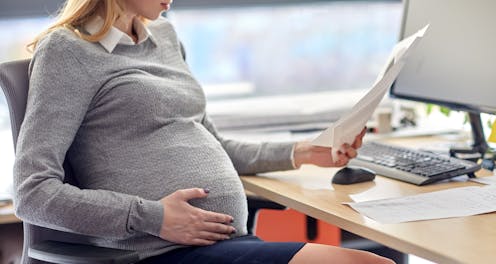pregnant women and working parents feel overlooked and undervalued in the workplace
- Written by Dr Rachael Potter, Research Associate and Lecturer in Work and Organisational Psychology, University of South Australia

Pregnant women and workers with children are often unfairly treated by their bosses and colleagues, despite laws to protect against workplace discrimination in Australia, according to a new study[1].
The prevalence of mistreatment has been revealed in the first national review of work-related discrimination, disadvantage and bias among pregnant and parent workers in a decade, undertaken by researchers from the University of South Australia.
More than 1,200 pregnant and parent workers responded to the survey, and despite being an intentionally gender-inclusive study, almost 95% of the respondents identified as female.
Disturbingly, the analysis revealed 91.8% of respondents experienced discrimination during their return-to-work phase, 84.7% during parental leave and 89% while pregnant at work.
One respondent reported:
I was told I wouldn’t want to return to work as I would be “clucky”. My career was severely impacted by my pregnancy, and I was forced to give up my team leader role.
Being overlooked while still in the workplace
A third of pregnant respondents (32.7%) said they did not receive any information about their upcoming leave entitlements such as whether leave could be extended if there were complications, or if anyone would be checking in with them while they were away.
Many said they missed out on training opportunities they were in line for (21.2%) had they not been pregnant while others said they were ignored or excluded (39%) from work-related activities and decisions as they were about to go on leave.
Just over a quarter (25.4%) felt they needed to hide their pregnant belly while 45.7% were ordered to do work below their competence level in the lead up to their parental leave starting.
One said:
I was denied permission to wear tights and a belly support while pregnant, despite the fact I was on my feet and had hip pain while working.
Some colleagues gave unsolicited advice and made unwelcome comments about how a pregnant woman looked, prompting a respondent to say:
We have poor systems for pregnancy in the workplace. Often companies have breastfeeding policies, but nothing for pregnancy. This leaves people open to project their opinion or experience on pregnant people, impacting their experience and often leading to discrimination.
Feeling forgotten and excluded
During parental leave, respondents stated being excluded from communications about work-related or social events.
Many said they would have liked to use “keep in touch[2]” days which might include attending a planning meeting or doing some training before returning to the office, but were not offered this option.
My employer (and many others) find it hard to figure out the “keep in touch” days which are available through the government paid parental leave. It would have been nice to be able to easily access these and attend a day here and there.
And more than half (50.8%) were not told about workplace restructures or other changes in their absence that could affect them on their return.
Also, 21.3% of workers on parental leave were pressured by their manager to begin or finish their leave earlier or later than they wanted to fit in with the workplace’s or management’s needs.
Three quarters of respondents said they would have liked to have extended their time away to care for their child because their partners (in 35.1% of cases) did not get parental leave.
When returning to work, parents said they encountered the most discrimination, such as receiving negative comments from managers or co-workers about working part-time or needing flexible work hours (43.9%).
Many had their role dramatically redesigned without any consultation and felt they were being denied opportunities due to working less days.
I feel I am overlooked and not shortlisted to interview for roles because I work part time. I am highly qualified for these roles.
Just over 45% said they were given fewer opportunities for career advancement and promotions because they were “just a mum” and faced the assumption that they “might get pregnant again” and were therefore unlikely to stay around.
Almost 27% did not have access to appropriate breastfeeding or expressing facilities and, as such, were often forced to express in a locked toilet cubicle or standing up in a cluttered cupboard.
Attitudes need to change
Pregnant and parent workers represent a substantial proportion of the Australian workforce. More than 20%[4] of all Australian households have young children.
The 2023 Australian Institute of Health and Welfare reported the number of children has increased[5] over the last 50 years, with the number estimated to grow to 6.4 million by the year 2048.
Without intervening action, pregnancy and parental work-related discrimination will remain common and socially tolerated, adversely affecting more of the population.
Having a designated Fair Work Ombudsman who focuses especially on pregnant and parent workers would help change attitudes and bring about change.
Read more: Mothers are more likely to work worse jobs – while fathers thrive in careers[6]
Employers need to ensure pregnant and parent workers receive the same opportunities and recognition as other employees. Providing breastfeeding areas and relevant facilities should be mandatory.
Managers have a duty of care and should engage in consultation and discussion with workers at each stage – pregnancy, parental leave and return to work – to establish clear mutual expectations.
There are already anti-discrimination laws in place in Australia that are clearly not being enforced. There needs to be mandatory regulation of employers to ensure they are providing pregnant and parent workers with the professional and personal support needed.
References
- ^ study (www.unisa.edu.au)
- ^ keep in touch (www.fairwork.gov.au)
- ^ DinaPhoto/Shutterstock (www.shutterstock.com)
- ^ 20% (www.abs.gov.au)
- ^ has increased (www.aihw.gov.au)
- ^ Mothers are more likely to work worse jobs – while fathers thrive in careers (theconversation.com)
Authors: Dr Rachael Potter, Research Associate and Lecturer in Work and Organisational Psychology, University of South Australia














